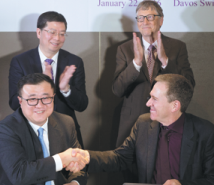Institute at forefront of infectious diseases fight


Under such circumstances, Lu said the institute is trying to find innovative drugs that either aim at new target, or to develop new mechanisms for existing targets.
It has established the "pipeline" process that covers different stages of developing a new drug, from early research to lead optimization, and then to pre-clinical study.
Thanks to the Bill& Melinda Gates Foundation's extensive global partnership network, the institute has cooperated with leading institutions and companies, such as the California Institute for Biomedical Research, the Medicines for Malaria Venture and United Kingdom pharmaceutical company GlaxoSmithKline.
These collaborations have enabled it to build a global network for new drug research and development.
Lu said: "It usually takes organizations six to eight years to build a complete pipeline. But with help from the global network, GHDDI only spent two years completing this task."
To ensure the process works efficiently, the institute places different projects at varying stages of development in the pipeline. When something goes wrong - for example, a drug target proves to be toxic and cannot be developed, it is replaced by another project, ensuring that the testing continues.
Lu said the institute is trying to successfully hit a series of "milestones" for each project along the pipeline.
The variety of projects means that the pipeline is "versatile" and will eventually help produce drugs to treat multiple diseases, she added.
Located in Dongsheng Science and Technology Park outside the North Fifth Ring Road in Beijing, the institute has built a 6,000-square-meter world-class drug research and development center.
The center has established key laboratories for different stages of drug development. It is also equipped with sophisticated instruments and facilities to provide professional and reliable support for new drug development.
Lu said the institute considers itself a platform for innovative drug development - somewhere between academia and companies.
Traditional institutions at universities focus more on basic research, such as discovering potential treatment methods, but less on converting these into actual products, she said.
"But the institute is oriented by the final product, which means a tablet that can go for Phase I clinical trials," Lu said. "If academia is conducting 'discovery science', then what we are doing is 'translational science' - paying more attention to the process from method discovery to preclinical study."
By comparison, pharmaceutical companies can carry out the entire process - from research to the development of new drugs.
However, since not all research results in pills being produced, it is highly likely that after thousands of trials just one study will succeed in becoming a safe and effective treatment for patients with infectious diseases.
"The whole process can be costly and time-consuming. And for a company seeking to make a profit, this is akin to investing in projects with high commercial potential," Lu said. But as a not-for-profit organization, the institute does not have to think too much about this.

Tsinghua University, the Bill & Melinda Gates Foundation and the Beijing Municipal Government adopted a "public-private-partnership" model, also known as PPP, to establish the institute. All three are also on the institute's board.
Lu said Tsinghua University has academic research strengths and rich experience in implementing nonprofit research institutions. The foundation provides global resources, and the municipal government can provide various forms of policy support on talent recruitment and innovation.
Significant decisions at the institute, such as budgets, appointments of senior staff members and planning, must be reported to the board. At the same time, the organization retains a high degree of autonomy - for example, intellectual property belongs to the institute, rather than any of the founding partners.
"Establishing the institute was also a new application of the PPP model, because previous projects mostly centered on infrastructure construction," Lu said. "GHDDI is the only scientific research institution that is private, non-enterprise and foreign invested in China."
The organization's operating funds come from the municipal government, as well as institutions such as the Bill& Melinda Gates Foundation.
Lu said that this way, there is no need for researchers to think too much about input and output, just to focus on research and testing.
"We want to run the institute like a business, and hopefully earn some money from the final products in the future," she said. "But we will do this to provide medicine to patients at a reasonable and affordable price, not to make a profit."
However, the institute has encountered some problems.
For example, Lu said that as it is not part of the national research system, this means it does not qualify to apply for blood for scientific or national research projects.
But she said she is optimistic about the institute's development, and believes it will lead the way for similar organizations to emerge. Chinese Ministry of Science and Technology recently published a guideline to support the development of new type of research organizations, which is expected to resolve current challenges that the institute is facing.
The institute is poised to introduce more pipelines that are closely related to global heath, such as research on hepatitis B.
"We also want to launch a research program on tuberculosis, and hopefully we can cooperate with hospitals and universities in Beijing," Lu said. "We not only care about global health issues, but also want to help solve domestic public health problems."
- Viral video shows meteor streaking over Helan Mountains in Ningxia
- China innovates network technology, achieving efficient data transmission
- More international maritime disputes turn to China's courts
- Chinese researchers inject AI power to evidence-based medicine
- Harbin Ice and Snow World opens with expanded park
- Visa-free transit policies spur surge of foreign visitors





































